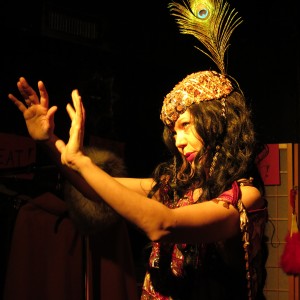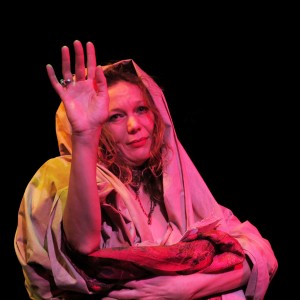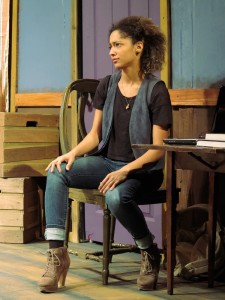The premise of Barabbas, Will T. F. Carter’s new play currently in production at the Theater for the New City, is certainly intriguing. Set in a Peruvian prison during a period of insurgency and guerrilla warfare, the drama uses the story of Barabbas and Jesus to explore topics such as self-preservation, personal sacrifice and forgiveness. Unfortunately, the drama, which centers on the Sendero Luminoso (or Shining Path) revolutionaries in 1980s Peru, never ignites any sparks.
Drama about Russian gays scheduled
Theater for the New City will present the world premiere of Frank J. Avella’s Lured, a play about the persecution of gays in Russia, for a three-week run Nov. 8–25; it is then scheduled for a production in January at the Onstage! American Theater Festival in Rome. Based on fact, Lured focuses on one particular Russian hate group’s attack on a young gay man and the repercussions that follow, after his loved ones decide to take action. The production, first seen at the Dream Up Festival in 2016, is co-directed by Carlotta Brentan and playwright Avella. Tickets are $18 for all performances and are available in person at the theater prior to each performance, by calling SmartTix at (212) 868-4444 or by visiting luredtheplay.com.
Love is a Dangerous Game
The small stage where Almost Mata Hari: Lovers, Letters and Killers by Eva Dorrepaal which explores the life of Mata Hari, the infamous courtesan-cum-spy, as well as parallels to the dangerous loves in her own life, is tucked away in the basement of Theater for the New City. This venue has many theaters; two are in the basement on opposite sides of the building. But the spectator is rewarded with the discovery of finding the right door. And descending the dark staircase is the perfect entrée to Dorrepaal’s world. Set as a living room, it looks as if it will explode with one false move: clothing and bric-a-brac are strewn everywhere. Short directives such as “Breathe” are pasted everywhere, as are Dorrepaal’s notes about Mata Hari: a timeline of her life and lists of men. The feeling is potentially claustrophobic and one wonders if Dorrepaal has been reading up on the avant-garde theater provocateur, Antonin Artaud’s concept of a “Theatre of Cruelty” which called for the "communion between actor and audience in a magic exorcism (…) to shock the spectator into seeing the baseness of his world.” Artaud was known to stage plays or scenes in isolated places where, one person who attended an Artaud play in the '60s, claims, “there could have been a murder and no one would have known.”
Dorrepaal appears debased at first—her clothing is disheveled, and she is harried and seemingly uncomfortable. She recalls an early abusive relationship: a broken jaw leads her to a dentist whom she eventually takes up a relationship with. Dorrepaal’s play begins in an emotionally Artaudian vein: two hours of listening to stories about violent relationships would have definitely felt entrapping and scary. She briskly changes pace and shifts the focus.
As an actress, Dorrepaal is fidgety, breathless and wide-eyed, which gives the impression of a woman on the verge of a nervous breakdown. However, there are interesting angles being worked which reveal three distinct layers: how an actress prepares (Dorrepaal refers to the method acting approach of using sense memory), her personal stories about past lovers, and her response as both an actress and woman to the story of Mata Hari’s life. The premise of Dorrepaal’s show is that she is an actress writing a play about Mata Hari. However, Dorrepaal inserts herself into the performance, and comments on the difficulty of acting, as well as the role of Mata Hari. Under the guide of a less gifted actress, this triadic approach could have been confusing, but Dorrepaal is a masterful performer. And funny too. In one scene, Dorrepaal is playing Mata Hari as a dancer and courtesan. She changes in front of us and puts on an Indian dance costume, with a spangly bra and a full skirt. As Mata Hari she’s dancing, but after awhile Dorrepaal, the woman, gets fed up and screams: “She’s so crazy” (about Mata Hari) and “Fuck, I’m going to have to hire a choreographer” (about herself as a performer). There are many more moments like this that lift the show from a purgatory exploration of women’s abusive relationships to a true exploration of the complexity of being a woman, of love and of being an actress.
Dorrepaal brings to light the dangerous nature of love. Mata Hari had many lovers—particularly military men in high commanding positions—and was rewarded richly with money and goods. She was known to be a spy but no one knew whether she did it for the money or because she could. In the end, she was convicted to death by a firing squad for being a spy; supposedly betrayed by one of her lovers. Dorrepaal informs us that “she died like a man” because she refused a blindfold. Dorrepaal also experienced dangerous love, first with the man in her early years who broke her jaw, and then with Dragan Zabek, an “irresistible mystic who worked as a street performer.” Dorrepaal leaves Holland, her native land, when she wins a green card only to learn that Dragan killed his former girlfriend—viciously strangling her and dragging her from one place to another—and then hung himself in prison.
Dorrepaal is an intriguing actress. She is tall and thin and looks like she has lived life. Her natural hair, which is a wiry reddish brown, often behaves like the wig she dons when she portrays Mata Hari. When she flips it over to one side, it stays there. Other times, it flairs around her face, making her look angry or seductive depending on the angle. Dorrepaal is a shape-shifter as a performer.
In another actor, this could prove frustrating or make her seem uncommitted to her role, but in Dorrepaal, we see a range of emotion pass across her face in a small time span. Sometimes she looks beautiful, other times tormented. This shape-shifting of emotion seems more true to life in the face of dangerous love, which heightens the senses so that desire, fear and uncertainty exist simultaneously.
Almost Mata Hari: Lovers, Letters and Killers, written and performed by Eva Dorrepaal, runs until Jan. 24 at Theater for the New City (155 First Ave. between East 9th and 10th Sts.). Performances are Thursday-Saturday at 8 p.m. and Sunday at 3 p.m. Tickets are $10 and can be purchased by calling the box office at 212-254-1109 or visiting www.theaterforthenewcity.net.
Dilapidated Dreams
What happens when an aging softcore porn director returns to his family home in Levittown, L.I., to sort through the remnants of his childhood while harboring hopes of repairing broken family ties? Allen Wilder 2.0, currently running at Theater for the New City, urgently wants to come to terms with what it means to age while living a life, less than exemplary, full of unfulfilled dreams.
The fast-paced dialogue is handled aptly by three, age-appropriate actors: Joe Casey (Michael Sullivan), Steph van Vlack (Donna Mullins) and Becca Fox (Kayla). A special nod to van Vlack and Casey who, while probably afraid to show it, did very well baring more than their artistic souls.
There is the age-old argument in theater—should the playwright also be the director? Often, having the writer and the director be one in the same provides no distance from the work that is afforded a different director. While the overall direction of Allen Wilder 2.0 by Matt Morillo is exceptional, the challenge is in his script, which brings little that is new to the conversation of self-worth, family dynamics, aging, abandonment, parental divorce, sex, fear of intimacy, and the longing for approval.
The actors, however, bring life to what they were given. Casey embraced the ‘40-something animated male from Los Angeles with charm and certitude. His voice is clear and full of expression and was often burdened with the running gag, “It’s soft core!” when others referred to his directorial work in porn, attempting to somehow make it palpable. Casey’s personal challenge is evidenced with his thigh slaps as the end to arm or shoulder gestures. At second glance, his nude scene is apropos to the events and is played off well with the use of a plastic fireman’s helmet.
Michael’s love interest, albeit for one night, is his former babysitter, Donna, who has 10 years and two children on him. As Donna, van Vlack embodied all the fear of a middle-aged, small-town woman “challenged by gravity.” The character may have been full of fear, however, van Vlack embraced her curvaceous body when Michael was finally able to dispense with her dress. The "come here, go away" choreography between Donna and Michael wore a little thin after time, and the script didn’t provide much room for her character to grow; it left the audience wanting more.
Kayla, Michael’s niece, is argumentatively played by Becca Fox, who is fresh and crisp, with a confident edge to her voice. Kayla’s disdain for her uncle is exacerbated when she inadvertently walks in on the remnants of Michael and Donna’s tryst. Michael fumbled through his attempt to reconcile with her until she revealed that she read his journal that brought to light her grandfather’s overt racism. Given Kayla’s father is black, her mother’s attempt to honor the memory of the man, creates a wedge between Kayla and her mother that appears insurmountable.
The audience arrives to a blaring and lively '80s rock soundtrack. Once the play commenced, the dialogue is fast-paced with a few contemporary references and some humor woven into the script. When offered to drink from a bottle of 25 year-old whiskey, Donna asked, “No glasses, are we animals?” to which Michael slyly replied, “We’ll see.” Unfortunately, the overall script never appeared to find its footing or depth.
Designed by Mark Marcante, the set is the abandoned family home in Levittown. There are a few subtle references to the famous mid-century track homes; a piece of abstract art and two Arthur Umanoff-style wood slat swivel counter stools. Packing boxes are stacked in the corner for Michael to go through the things he left behind, and there is an oddly placed desk, devoid of a lamp or phone, off to the side near the backdoor. The house felt more like an abandoned farmhouse rather than a residual to the testament of the “American dream” for a middle-class family.
The unfortunate thing about the lighting, designed by Amith Chandrashaker, is that no reference is made to night or day; the lights are on. After returning from a night of drinking, Michael and Donna burst on scene, well into the evening, with the porch light lit, while Kayla finds them asleep in the morning all to the same lighting in the second scene. The play takes place over a 12-hour period leaving the imagination to conjure evening, morning and mid-day lighting.
The credit for an enjoyable evening goes to the actors and their willingness to step outside themselves, embodying the characters on the printed page of Allen Wilder 2.0. The kindness portrayed by Michael’s character near the end of the play may not have much lead-in, but offers a glimpse into the generosity of human spirit with the ability to start anew merely by saying so.
Allen Wilder 2.0 runs until Jan. 31 at Theater for the New City (155 First Ave. at East 10th St.). Performances are Thursday-Saturday at 8 p.m. and Sunday at 3 p.m. Tickets are $18 and can be purchased by calling SmartTix at 212-868-4444 or visiting www.smarttix.com. For more information, visit http://www.theaterforthenewcity.net/allenwilder2.html.











